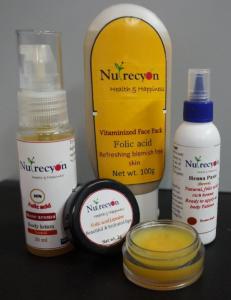
Anemia and micronutrient deficiencies are widely prevalent globally. This is particularly true in developing countries and amongst girls and women of child bearing age. While fortification is one approach, this is often limited by adverse effects on taste and low stability of the nutrients on storage and cooking. Gastrointestinal disturbances due to iron supplementation capsules also lead to low compliance. Further, since micronutrients deficiencies can often go undetected and require long periods of supplementation, this compliance for fortification or supplementation is limited.
The skin represents a large surface for delivery of agents. However the outermost layer is impermeable and prevents efficient delivery of actives. Our technology helps to overcome this barrier and control delivery through different parts of skin. The technology consists of novel nutrient loaded cosmetics which are enriched with tiny particles which enhance penetration through different layers of skin. The technology is versatile and allows us to control whether the nutrients are to be delivered to the outer most layer (stratum corneum), upper layer (epidermis), or middle layer (dermis), of skin to the hair follicles or through skin into blood (transdermal). Incorporation within cosmetics and use of the skin as a route of delivery overcomes the challenges of conventional fortification and provides an alternative route and user friendly option for nutrient fortification. The technology is applicable to both urban and rural women as the cosmetic bases are diverse and include body lotions, lip salve, face packs, mehendi and bindis. It can also be extended to body oils and hair oils which can be used by both women and men. The cosmetics are made affordable so that they can be used by rural women also. A US patent has been granted for this technology.
The cosmetics are ready at the lab scale, have been validated using cellular models and are non-irritant to skin in healthy volunteers. The technology is ready for scale up, and clinical trial / commercialisation.
(Late) Prof. Rinti Banerjee
